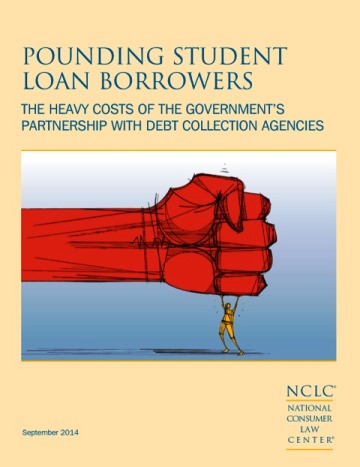The Heavy Costs of the Government’s Partnership with Debt Collection Agencies
Overview
The U.S. Department of Education refers every eligible defaulted student loan debt to private debt collection agencies. Collectors are hired not only to collect money, but also to communicate with borrowers about options to resolve their debt, creating a conflict of interest. Promoting paths to success for these borrowers is ultimately less costly for taxpayers, yet the Department hammers borrowers with draconian collection tools.
The government must balance the need to collect loans with the need to assist borrowers. Yet, the current system favors high pressure collection tactics and private company profits. The system fuels widespread violations of consumer protection laws and prevents borrowers from assessing their rights.
Report (also B/W version)
Appendices, including Dept. of Education documents obtained through FOIA lawsuit
Key Findings
Government Incentives Drive Collection Agency Behavior and Harm Consumers
Changes made to the compensation system in July 2012 demonstrate that the options collection agencies offer to borrowers are driven by the fees the government pays, not by the law. Loan “rehabilitiation” is an important way for a student loan borrower to get out of default . Before July 2012, the government paid a much higher fee to a collection agency that arranged for a loan rehabilitation that required payments that did not take the borrower’s income into account than for one that did. Even though borrowers have long been entitled to more affordable rehabilitation payments based on the borrower’s financial circumstances the government’s collection agencies almost never arranged them until the government equalized the fee structure in July 2012. Bottom line: money, not the law, drives collection agency behavior.
Government Evaluation System Favors Debt Collectors over Borrowers
- NCLC’s analysis of Department of Education documents obtained through its FOIA lawsuit found that in FY2012, the Department consistently failed to take borrowers’ complaints and experiences into consideration when evaluating performance of debt collection agencies.
- Others have reached the same conclusion. In 2014, the Department of Education’s Office of the Inspector General found that the Department of Education failed to:
A. Monitor borrower complaints against collection agencies, and
B. Did not take corrective action against the agencies when they did not improve.
The result?
The Department’s Federal Student Aid office failed to ensure the collection agencies it hired abided by federal debt collection laws and the terms of their contracts.
Recommendations for Reform
- Eliminate the use of private collection agencies and move toward a comprehensive and individualized counseling model. In deciding how to work with borrowers in default, the Department should study alternatives and create pilot projects with empirical research to test these options. The goal of this model should be to match the borrower with the right program based upon circumstances, not just to collect the most money for the Department.
- Reform the debt collection agency evaluation system so that performance is about more than dollars collected.
- Eliminate conflicts of interest by using neutral entities to administer extra-judicial collection, such as administrative wage garnishment.
- Improve transparency and provide public information about the private debt collectors’ performance, including complaints and any investigations or disciplinary actions taken against private debt collectors and the cost of outsourcing to them.
- Congress and the President should improve the Department of Education’s oversight of collection agencies and require the Department to make public information about how performance is tracked and the results.
- Hold collection agencies accountable through rigorous public and private enforcement.
- Improve the complaint system so that student loan borrowers can easily file complaints about collection agencies.
- End the Performance Based Organization experiment and set up a system that clearly puts borrowers first.
- Expand online options so that borrowers can more easily access programs, such as rehabilitation, without needing to go through a third-party collection agency.
- The Department of Education should improve its data collection system and make the information public to ensure integrity of data collected and the programs it administers.
By the Numbers
Federal Student Loan Debt
|
More than 39 million |
|
$1 trillion |
|
$686 billion |
|
$89 billion |
|
$38 billion |
Commissions to Private Student Loan Debt Collectors Paid by Borrowers and Taxpayers
|
$1 billion |
|
$2 billion |

